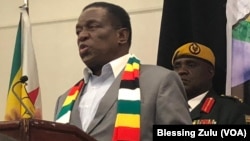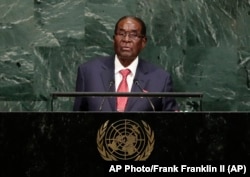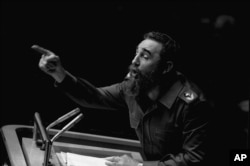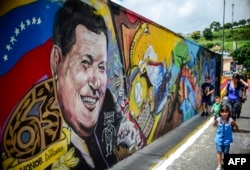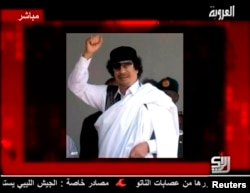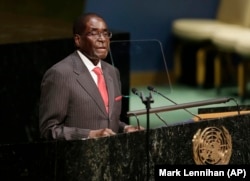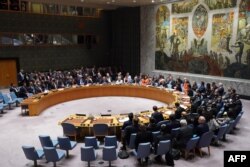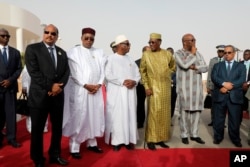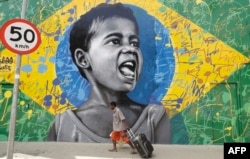Zimbabwean President Emmerson Mnangagwa is today set to deliver his maiden speech to the 73rd session of the United Nations General Assembly in New York after toppling former President Robert Mugabe with the help of the army in November last year, and winning an election in July that his main opponent is refusing to concede.
But around the United Nations corridors and perhaps the world, some political analysts are saying he is not generating enough buzz as his predecessor Mr. Mugabe, who despite being loathed by many as a dictator, was a powerful orator and provided memorable moments at the United Nations.
Mr. Mugabe is seen by political analysts as being in the league of former late leaders Cuban Fidel Castro, Venezuela strongman Hugo Chavez, and Libya’s Muammar Gadhafi.
FIDEL CASTRO
Castro, who died on November 25, 2016, once took a swipe at Washington in the longest timed speech at the UN General Assembly which lasted 4 hours and 29 minutes on the 26th of September, 1960.
He described his 1959 Cuban revolution during his speech as having ended his Latin American country's status as “a colony of the United States and condemned Washington for promoting anarchy in his country, in the mistaken belief that it had “the right to promote and encourage subversion in our country.”
Wearing his trademark green military fatigues, Castro called then U.S President John F Kennedy “an illiterate and ignorant millionaire”.
HUGO CHAVEZ
Chavez, an ally of both Castro and Mugabe who succumbed to cancer in 2013, also read from the Castro handbook according to some analysts.
Chavez shocked the world in his 2006 UN General Assembly speech when he sarcastically called former U.S President George W. Bush “the devil”. Speaking a day after Bush addressed the world body, Castro said, “Yesterday the devil came here. Right here. Right here. And it smells of sulfur still today, this table that I am standing in front of.”
MUAMMAR GADDAFI
Colonel Gaddafi, who was captured and killed during the battle of Sirte on 20 October 2011, had two years earlier delivered a rambling speech timed at 1 hour and 36 minutes leading to many delegates leaving the room.
He appeared to tear a copy of the United Nations Charter claiming he did not recognize the document.
But even before tearing the UN Charter, Gaddafi had also caused a stir in New York when he brought his traveling Bedouin tent to a property belonging to now U.S President Donald Trump near the UN Headquarters.
Gaddafi, who shunned hotels because he allegedly feared heights and elevators, had also tried to erect the same tent in New Jersey and the Central Park and was barred by U.S authorities.
ROBERT MUGABE
Mr. Mugabe, according to some political analysts, was the defacto spokesman of developed nations when it came to calling for United Nations reforms and also standing up to America.
Last year, President Trump was the target of Mugabe’s vitriol. After Mr. Trump delivered his maiden speech, threatening to wipe out North Korea and describing its leader Kim Jong Un as “Rocket Man on a suicide mission for himself and for his regime”, Mr. Mugabe pushed back and attacked Trump in an address that went viral.
Mugabe said, in his last address at the UN before he was toppled, “Some of us were, embarrassed, if not frightened, by what appeared to be the return of the Biblical Giant Gold Goliath.” He added, “Are we having a return of Goliath to our midst, who threatens the extinction of other countries? And may I say to the United States president, Mr. Trump, please blow your trumpet — blow your trumpet in a musical way towards the values of unity, peace, cooperation, togetherness, dialogue, which we have always stood for and which are well-writ in our very sacred document, the Charter of the United Nations.”
In his 2009 address, Mr. Mugabe also hogged the limelight when he attacked homosexuals in off the cuff remarks saying at the UN podium, “We are not gays!” Mugabe accused Western nations of trying to prescribe new rights that are “contrary to our values, norms, traditions and beliefs.”
MUGABE IMPACT
But despite going overboard in his criticism, former President Mugabe, according to even his strongest critics, was sometimes a voice of the voiceless developing nations especially in his call for United Nations reform. Mugabe forcefully pushed for the elimination of the U.N. Security Council's veto power, which is dominated by five permanent members, the United States, Britain, France, Russia and China.
In 2016, speaking in his capacity as Zimbabwean president and chairman of the African Union, Mugabe called on his Asian and African counterparts to join hands in reforming the UN Security Council to fight against the political domination of the five permanent members of the UN body or seriously considering pulling out of the world body. "One of the essential ingredients in doing so will be the strengthening of our unity in continuing to fight for a United Nations that recognizes all its partners as equal partners," the then president said.
Mr. Mugabe later labeled fellow African leaders cowards for failing to forcefully push for the reform of the Security Council. He said, “I don’t know if we are going to come up with a common decision. There are other countries that are cowards. Africa is now led by new leaders who are no longer members of the founding fathers of the Organization of African Unity. It is now led by cowards only, without direction … It cannot only be Mr. Mugabe who comes out calling for UN reforms.”
Ironically, the AU endorsed the Mugabe soft coup arguing that the Zimbabwe Defense Forces’ intervention did not “constitute a coup d’état.”
Executive Director of Vanguard Africa, Jeff Smith, a longtime critic of President Mugabe’s excesses, admits that his sting will be missed by those calling for UN reforms. “Despite Mugabe's nearly four-decade rule marked by corruption and widespread human rights abuses, he was often spot-on in terms of the need for reform of the United Nations, especially the Security Council, which is out of step with 21st century realities.”
Tswane University lecturer, Dr. Ricky Mukonza, concurs, saying, “Mugabe represented that strong Pan African view that got him both admirers and enemies in equal measure.”
He added, “His courage in speaking truth to some of the global superpowers was necessary, though it came at a great cost to Zimbabwe, and is currently being missed on the global arena.”
Mandela Washington fellow, Godfrey Kurauone, is of the same opinion saying Mugabe was “very clear and determined in making sure that Africa is recognized by the international community.
Kurauone called other African leaders spineless. “The rest of our African leaders are puppets of the West and feel that demanding for their space threatens their relations with the super powers.” He, however, says Mugabe was not respected by the West and he was largely dismissed and ignored.
Political analyst and former Zimbabwe National Students Union leader, Avoid Masiraha, says Mugabe will be missed on the international stage. “Yes we indeed lost a voice because now no one has the audacity to raise the issues to the level at which Mugabe did. He had his faults but his legacy of pan Africanism will live.”
The unwritten rule at the United Nations General Assembly is that leaders speak for a maximum of 15 minutes, but some disregard this recommendation. Brazil speaks first and followed by the host nation, America. But why Brazil first?
United Nations chief of protocol, Desmond Parker told American broadcaster, National Public Radio in 2010 that Brazil earned the honor and right. “Brazil, traditionally, has held the first slot because in very early times, when no one wanted to speak first at the General Assembly, Brazil always … offered to speak first.” He adds, “And so they earned the right to speak first at the General Assembly.” And this has been the case since 1955.
The theme for this year’s global leaders’ gathering is ‘Making the United Nations relevant to all people: Global Leadership and Shared Responsibilities for Peaceful, Equitable and Sustainable Societies’.




